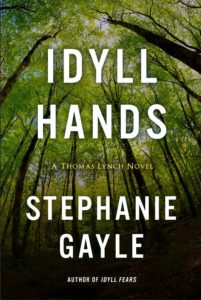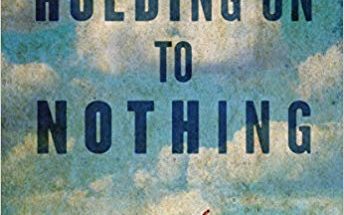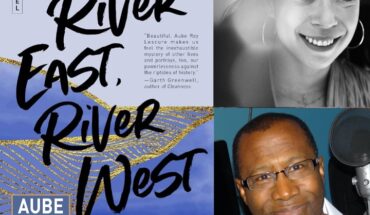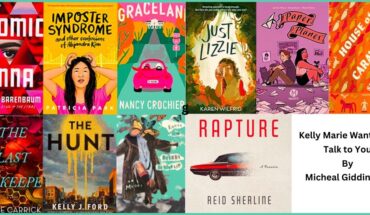 Stephanie Gayle is a writing machine. Her third book in four years, Idyll Hands, hits the stands in early September. It is the most recent in her celebrated Thomas Lynch mystery series, following Idyll Threats and Idyll Fears. The Strand Magazine says this latest work is “one of the best books we’ve read this year.” Mystery Scene Magazine calls it “Outstanding.” We at Dead Darlings say, these reviews do not surprise us. Only the twists in her stories do.
Stephanie Gayle is a writing machine. Her third book in four years, Idyll Hands, hits the stands in early September. It is the most recent in her celebrated Thomas Lynch mystery series, following Idyll Threats and Idyll Fears. The Strand Magazine says this latest work is “one of the best books we’ve read this year.” Mystery Scene Magazine calls it “Outstanding.” We at Dead Darlings say, these reviews do not surprise us. Only the twists in her stories do.
Idyll Hands features Chief Thomas Lynch, a gay police chief stationed in a small Connecticut town, and one of his detectives, Michael Finnegan. Almost thirty years ago, Finnegan’s sister disappeared into thin air and was never heard from again. When a young woman’s body is uncovered in the woods outside of Idyll, Finnegan becomes overly enmeshed with the case. Lynch questions his involvement and eventually learns about his colleague’s sister. In spite of a thorny history, Lynch agrees to take on his sister’s case and, in exchange, asks Finnegan to investigate the unidentified body. Told in convincing detail, the story unleashes tightly held secrets, both past and present, and leaves the reader breathless, wondering what happened right up until the very end.
Stephanie will be at Porter Square Books in Cambridge on Tuesday, September 4th, 2018 at 7:00 PM to celebrate the launch of Idyll Hands.
1. We’re exhausted. It’s been two back-to-back nights of tearing through pages of Idyll Hands to get to the end because we couldn’t put it down. Is it fair to say you’re an expert at crafting “rising tension”?
No, I’m not an expert at crafting “rising tension” and I know this because I’m editing the next book in the series and I just wrote myself a comment that says, “Why does this chapter exist? Srsly.” I often re-read my work and find myself bored or realize I’m rehashing material. What I have gotten better at is identifying when I do this and fixing it so that the rising tension exists and feels organic. But it’s not an innate skill.
2. We like Thomas Lynch so much we want a t-shirt with his face on it. As I recall, you handed out t-shirts at your book launch last year so, there’s a tip for a new giveaway. Maybe Booklist will help make one because they feel “Lynch is a deeply compelling character” too. What made you conceive of Chief Lynch in the first place?
He was a voice in my head, a disenchanted cop who’d recently experienced something that made him reexamine his life. And that sounds very trite and like a million other books, so I worked hard to make him original. There were a lot of things I didn’t want Thomas Lynch to be: a Sherlockesque genius, an alcoholic, or a lone wolf (he is in book one but for reasons). I wanted him to be a man who loved his job but whose job didn’t always love him back. And he’s flawed, because I like a character with flaws. The other risk with creating Thomas was to make him a paragon, a shining example of a “good gay.” When dealing with minority groups, there is always a pressure to do that. He has very definite ideas about his sexuality and how he interacts with the world, and he resists being a spokesperson. I’m always joking that my agent likes me, but she loves Thomas. I think a lot of people feel that way.
3. Did you always envision a series?
I did when my editor asked if it was a series and I realized that meant the publisher would buy more books. But I was also still interested in it and wanted to write more about Thomas. If I had been less intrigued by him and his future, I wouldn’t have been able to write more books. Series have both good and bad things about them, and it’s been fascinating to learn more about writing one from the inside, since I binged mystery series as a reader for many years (and still do).
4. In your previous Idyll books, Chief Lynch is the only point of view character. In Idyll Hands, you make space for someone else, a detective, to share his perspective. We thought his voice added great depth and complexity to the book. What led you to the decision to allow this character to play a larger role?
I wanted to write something other than a first person POV, but third person felt like too much of a leap (although Lee Child did it in the Jack Reacher series). Detective Finnegan came to mind as the second narrator but because he and Thomas are close in age and ethnic background I was concerned that their voices would blur, or not be distinct. But Finnegan is much chattier and he reads a lot, so his references are different than Thomas’s. He also appears to be an open book, so the idea that he isn’t was super intriguing to me.
5. Getting in and out of scenes is so hard to do and braiding them together into an interesting, meaningful story is near impossible. As in your previous work, you make this look like an easy thing to do in Idyll Hands even though you’re working in both the past and present tense. Tell us your secrets.
Bless you. My tools are: Excel spreadsheets, calendars printed from the time periods I am writing in, and a brilliant editor, Dan Mayer, and copyeditor, Jade Scibilia. I stole the spreadsheet idea from fellow Novel Incubator student, Mandy Syers. For every chapter in the novel I track the pages, the date and time that it takes place in, major plot elements, and add notes like “add scents.” The spreadsheet really helps me see if I’ve lost a narrative thread for too many chapters or if I am neglecting a character for too long. This helps me keep the elements I need the reader to remember up front, and not out of sight for too long.
6. How was the process of writing this book different than the previous two? Any surprises or unexpected challenges?
I knew there would be multiple cases, and eventually decided it would involve missing persons, but I had no idea who was responsible. I’d set myself the challenge of two first-person points of view and two timelines (three if you count the early 1980s, when Finnegan finds “Colleen’s” bones). I was on a tighter timeline. I had to have it ready to go in one year, so that was a new challenge! I kept waffling on whether I would have one of the missing women be the victim of a serial killer. I went back and forth on that, multiple times. And I had to come up with more names, which is always a problem for me because I tend to name every man John. I went to school with so many Johns, and we had so many Michaels in my neighborhood that one was called “Baby Michael” forever.
7. You’re going to walk down the aisle in a few days. What about Chief Lynch? Do you think he’s going to find long-term love and commitment? Booklist feels that “readers will want to see how the next two decades treat this intriguingly complex cop.” It sounds like everyone wants more Thomas. Can you make that happen?
I’m walking into a meeting room at City Hall that I secretly hope will be filled with old telephone books and broken fax machines because pretty is nice but weird is memorable. As to Chief Lynch’s romantic future, it’s a work in progress. He’s never thought of himself as a one-man guy, but, in part, because his circumstances demanded secrecy. As to whether I can provide more Thomas: the next book, Idyll Gossip, will be out September 2019.
8. You began writing about Chief Lynch during your time in the Novel Incubator program at Grub Street. Can you talk about what Grub Street means to you, the Novel Incubator program, in particular?
Grub Street was where I began taking creative writing courses after I left New York, heartbroken, and a hot mess, in 2002. I think of it as the place that nurtured me and gave me a community. Novel Incubator taught me even more, and I acquired a tribe of writer friends I rely on daily. I can’t say enough good things about it. It was a lot of hard work, but so is writing a book a year, so it was excellent preparation.
9. What would you say to aspiring writers interested in applying to the Novel Incubator program?
Do it! Be prepared to kiss your social life goodbye, but also be prepared to learn tons, and to acquire a writing family. These people will know your work inside out, and they will advocate for you. They give out scholarships, so don’t let the cost dissuade you from applying. It’s the single best thing I did for my writing career.
Stephanie Gayle’s other publications include My Summer of Southern Discomfort, which was chosen as Redbook’s Top Ten Summer Reads and was a Book Sense monthly pick. Gayle has also published stories and narrative nonfiction pieces, including two Pushcart Prize nominees. For more information on Stephanie Gayle, including future book event dates, check out her website.



